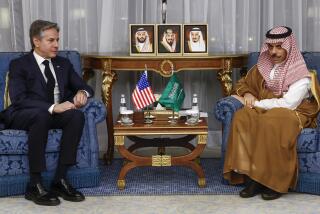Mideast Summit Teams Weighing Their Options
- Share via
THURMONT, Md. — With Israeli and Palestinian negotiators on a virtual round-the-clock schedule, the Camp David summit is lurching toward a climax today, when the leaders must agree on a peace package, devise some way to salvage a week of hard work or admit failure.
White House Press Secretary Joe Lockhart said Monday that there has been no change in President Clinton’s plan to leave for Japan on Wednesday morning to attend the annual summit of the world’s leading industrialized nations plus Russia, known as the Group of 8.
“The president has a schedule to keep concerning the G-8, which is an important meeting,” Lockhart said. “And that schedule hasn’t changed.”
Lockhart said the U.S. preference concerning the Camp David summit is clear: “The plan is to complete this process before the president goes.”
But the Israeli and Palestinian delegations are looking for fallback positions: Perhaps they could remain in session until Clinton returns from Japan on Sunday; maybe the president could delay his departure for a day or so; maybe the summit could recess and resume next month; or perhaps it’s time to give up.
But like almost everything else about this conference, it won’t be easy even to decide whether to go or stay. For instance, Israeli Prime Minister Ehud Barak has indicated that he would be reluctant to agree to a recess, which would give his domestic political opponents a chance to pick apart his summit performance. Palestinian sources say Palestinian Authority President Yasser Arafat is reluctant to stay at Camp David after Clinton leaves but would be willing to come back next month.
According to the Israeli newspaper Maariv, Barak notified Clinton on Sunday that he would remain in the United States only if there is a breakthrough in the talks before tonight’s deadline. Quoting “people close to the prime minister,” the newspaper said Barak will decide sometime today if there is any reason to continue the talks.
Arafat’s top deputy, Mahmoud Abbas, intends to be in the West Bank city of Ramallah on Thursday to attend the wedding of his son, Tarik. Many members of the Palestinian delegation have been invited to the ceremony by Abbas, who is better known as Abu Mazen and is one of the top Palestinian negotiators with Israel.
Asked about Abbas’ plans, Lockhart said, “I just know he has to leave by Wednesday, which is when the president plans to leave.”
Lockhart said Clinton wanted to attend the G-8 summit because those talks could be crucial to the future of the world economy. Moreover, he said, there is a tie-in with the Israeli-Palestinian summit.
He said the meeting in Japan affords “a good opportunity for the president to talk about the international community’s ability and responsibility” to pick up part of the cost of the foreign aid package that all sides believe will be necessary to seal any peace agreement.
On Monday, Clinton met separately with Barak and Arafat, but most of the action was among the negotiating teams dealing with each of the four “core” issues: territory, borders and Jewish settlements; Palestinian refugees; Israeli security; and the future of Jerusalem. Israeli and Palestinian negotiators who were not included in the Camp David delegations held parallel discussions about water, civil affairs and economics at nearby Emmitsburg.
Lockhart said both groups of negotiators have met late into the night and resumed early in the morning since the talks headed toward the home stretch Saturday night.
“There are a number of negotiators who have been awake for a very long time over the last several days,” Lockhart said.
Asked about their morale, he said marathon negotiating over the same difficult issues “is not conducive to the warm and fuzzies.”
Lockhart defended the extraordinary secrecy that has surrounded the Camp David talks. He said Barak, Arafat and their delegations were able to focus on the issues at hand instead of on the news coverage, which he said was not the case at previous conferences.
At the same time, Lockhart acknowledged that Clinton breached his own rule when he answered two questions on the Middle East at the end of an interview with the New York Daily News in which he had sought to refute reports that his wife, Hillary Rodham Clinton, made an anti-Semitic remark 26 years ago.
Lockhart said Clinton’s comments “were outside the rules that we’ve set down.” Although Lockhart chose his words carefully, there was no doubt that he delivered an unusual rebuke of the president by a press secretary. But he insisted that Clinton said little in terms of substance.
According to a White House transcript of the interview, Clinton said the talks were the most difficult he has ever participated in. He said he was more optimistic than at the beginning of the talks.
More to Read
Sign up for Essential California
The most important California stories and recommendations in your inbox every morning.
You may occasionally receive promotional content from the Los Angeles Times.













